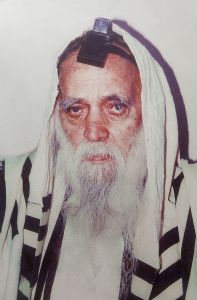A Short Tribute
Hacham Nissim Trabelsi was born to Camashna and Hacham Yitzhak in 1910, in Djerba, Tunisia. He was studious even as a child, and would go from synagogue to synagogue to learn Torah. As an adult, he studied with Hacham Makhluf Idan and Hacham Joseph Buchris. In 1929, Hacham Nissim Trabelsi married Atirssa, daughter of Pinchas Trabelsi, and the couple had eight children. That year, his mother-in-law died and they followed Hacham Joseph Buchris' advice and moved to live with his family in the city of Zarzis, Tunisia, where Hacham Nissim Trabelsi served as a children's teacher, shochet, cantor and halakhic adjudicator.
In 1949 Hacham Nissim Trabelsi immigrated to Israel, where he first lived in Ashkelon. After a short while, he settled in Moshav Tlamim. He worked as a farmer during his first years there, and then took on the position Rabbi of Moshav Tlamim.
Hacham Nissim Trabelsi led the Tlamim community for 50 years. He founded the Ateret Hen synagogue in his home, where he gave Torah classes. Every Thursday, he would travel to Hacham Raphael Kadir Tzabban's home to study Torah with a group of sages from the region that included Hacham Almoslino, Hacham Peretz Maimon, Hacham Shlomo Mazouz and others.
Hacham Nissim Trabelsi was known for his great devotion and love for the community, in particular for its children. He held an afternoon of intensive study for the moshav's children on a regular basis, during which he taught reading and Chumash.
In 1983, after his wife's decease, Hacham Nissim Trabelsi collected his original commentary in a book he entitled Em HaBanim Semeha.
Hacham Nissim Trabelsi passed away on 15 Sivan, 5757 (1997). The Pe'er Nissim non-profit organization, which operates a kollel and charity fund, was founded in his commemoration.
